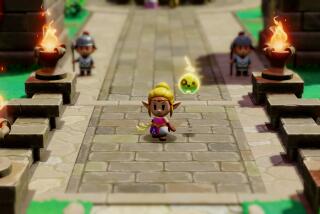The Player: ‘Severed’s’ one-armed warrior and her search for home are made for our mobile gaming age
Early in the game “Severed,” one of the more striking images you’ll see this year in a video game appears. A woman of mixed-race descent stands before a mirror, her yellow dress bloody, her arm a stub and her eyes wide in shock.
The world is bright and blocky — a handcrafted-looking universe that seems constructed of paper, but immediately the tone drifts toward melancholic. The art almost appears lifted from a Dia de los Muertos display, and though this is the beginning of the journey for young Sasha, it also feels like the beginning of an end.
Welcome to one woman’s nightmare.
It only gets worse. Sasha’s family is missing, their belongings scattered around this universe — one that feels like death sprung to life. Oh, and since this is a video game, there’s an assortment of monsters — boxlike-skulls, multi-armed monkey-like creatures, a giant blinking eye on a gelatinous purple pedestal — who are after Sasha.
“Severed,” from Toronto independent studio DrinkBox, is a touch-control, role-play game. After all, there are dungeons and monsters and magic. But the game, available now for Sony’s handheld device the Vita, is also about loss and grief as much as it is about Sasha’s one-armed ability to wield a sword.
Set in a frightening, mysterious world, the game asks if an ordinary woman-turned-warrior can conquer her fears and come to grips with the unknown fates of her family.
The way she’s showing her frustration and lack of power is by raging against the world. ... She’s a very determined woman, and that strength comes from the pain.
— DrinkBox’s Augusto Quijano
“Sasha is such an interesting character. I really like her,” says DrinkBox’s Augusto Quijano, one of the project leads on the game. “There’s not a lot of interactions, but she seems like someone who’s just constantly internalizing things. She’s quiet, but there’s something brooding about her personality.”
When “Severed” shows us a close-up of her face, Sasha looks unwavering, as if trying to project an age beyond her years. Little is spoken in the game, and the title’s sparse but dooming score contrasts with the vivid and colorful look of the world. The mood becomes darker as family trinkets are found and “Severed” hints throughout at a grim fate for Sasha’s family.
“It’s a rite of passage story, and she just needs to mature, and the way she’s showing her frustration and lack of power is by raging against the world and things that have happened,” Quijano says of Sasha. “She feels like all of this is unfair, and she’s just literally lashing out at these monsters that she encounters. She’s a very determined woman, and that strength comes from the pain.”
He adds, “Sometimes you need to rely on rage to pull you through. It’s just like a process you need to go through. It may not be pretty, but it’s necessary to mature, to grow as a person.”
“Severed” is also novel in its presentation. Though only a Vita version of the game has been announced, its touch-based controls are expertly suited for our mobile gaming age. Fighting is done not by a press of a button, but a swipe of the screen. The player must learn the rhythms of “Severed’s” foes and swipe in time.
It also continues a trend for what is shaping up to be one of the more thoughtful but experimental years in gaming. Titles such as “That Dragon, Cancer,” “Firewatch” and “Oxenfree,” while not set in the typical video game dystopian universes, navigate more personal — at times, hopeless — themes, whether it’s the struggle of a terminal illness or the loneliness of no longer being able to communicate with a loved one.
Quijano says “Severed” was born of his thinking about his family. Raised in Mexico and based in Toronto, he wanted the game to capture a helpless, long-distance feel. The inspiration for the game, he says, came from conversations with his mother, which were tinged with sadness due to his inability to be in the same room with her.
“For me, I was thinking a lot about memories, and I was thinking a lot about being away,” he says. “I moved from Mexico, and my family is back there. A lot of the interactions we have are this weird long-distance thing. You have Skype and everything, and that’s great, but there’s a visceral separation.
“I was thinking a lot about that stuff, the separation,” he continues. “That’s the kind of themes I started to explore, and you turn it to 11.”
“Severed,” then, is a metaphor.
The challenge came in conveying the game’s themes without becoming too, well, game-like. The small “Severed” team — the game was made by fewer than 20 people — settled on something of a more minimal approach. Enemies would say next to nothing, and images, such of those of Sasha standing in front of a mirror, would carry the weight of the tale.
“Sometimes games are not known for trying to do this interesting narrative,” Quijano says. “They’re starting to shift toward that, but you can get stuck. You need to remind yourself, what is important for the character and not for the player playing the game? They expect to gather all the stars and save the world.
“For me, I always defaulted on the character. What’s the truth for her?”
‘Severed’
Developer and publisher: DrinkBox Studios
Platform: Sony’s PlayStation Vita
Price: $14.99
Release date: April 26
MORE FROM THE PLAYER:
‘Uncharted 4: A Thief’s End’ serves up action ... and personal issues
‘Late Shift’ is the first fully realized choose-your-own adventure movie. Or is it a game?
On Twitter: @toddmartens
More to Read
The biggest entertainment stories
Get our big stories about Hollywood, film, television, music, arts, culture and more right in your inbox as soon as they publish.
You may occasionally receive promotional content from the Los Angeles Times.











